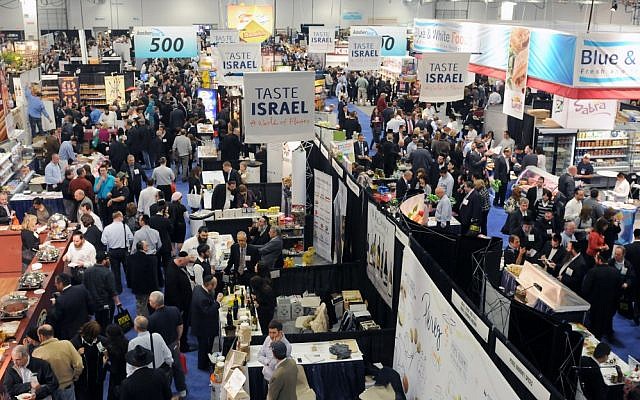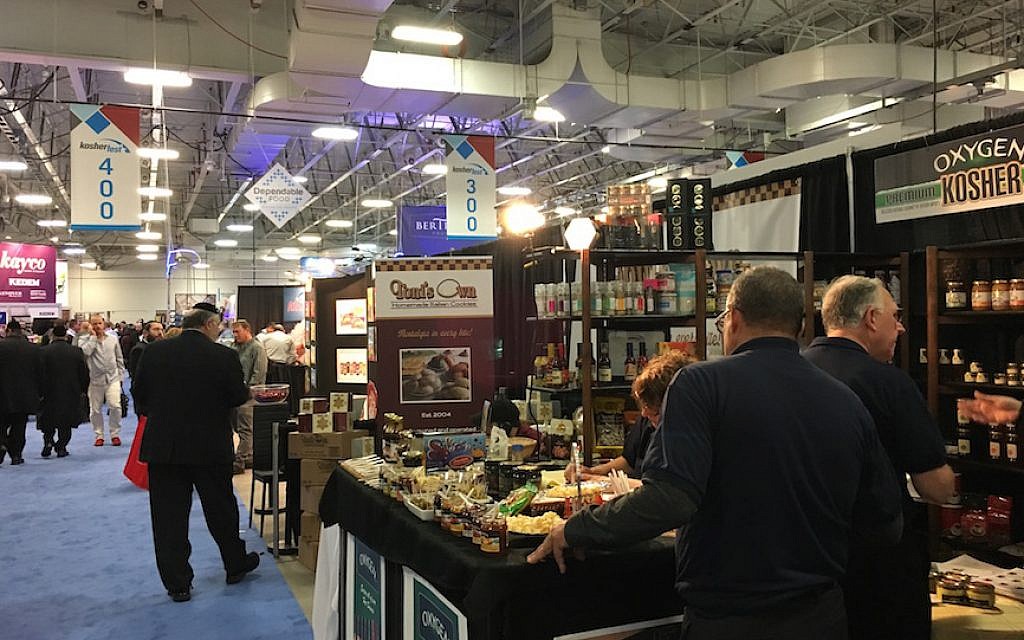After 3 decades Kosherfest food fair bites the dust, reflecting a changing industry
The decision comes as kosher food has gone mainstream, with some 40% of packaged food and drink sold in the US certified kosher as of 2018
JTA — After more than three decades, an annual trade show of kosher foods that saw the evolution of the cuisine in America grow from gefilte fish and pastrami to “facon,” gluten-free cookies and CBD gum is no more.
“Exhibitors feel Kosherfest has run its course,” the company that organized the two-day event, Diversified Business Communications, announced on March 31.
The company’s statement attributed the decision to shifts in the supermarket industry and in how stores display and purchase kosher products. Buyers for supermarkets, it said, are increasingly likely to buy kosher products at general trade shows, rather than at events specific to kosher food.
“As this buyer is responsible for sourcing and purchasing a wide array of products, they are more likely to attend food events displaying items not just exclusive to kosher,” the company said. “A certified kosher only food show such as Kosherfest is too niche for their attendance.”
The decision to cancel Kosherfest — which has included more than 325 exhibitors displaying their products and has drawn as many as 6,000 attendees each fall — comes as kosher food has gone mainstream. As of 2018, according to the Boston Globe, some 40 percent of packaged food and drink sold in the United States was certified kosher. Last year, Rabbi Eli Lando, the executive manager of OK Kosher, a certification agency, said Jews make up just 20% of kosher products’ consumer base, according to the publication Food Dive.
At the same time, supermarkets and other pillars of the kosher marketplace have been joined by social media influencers in promoting new food products to Jews who keep kosher. That shift was accelerated during the pandemic, when Kosherfest was suspended for a year before returning to muted crowds in 2021. Recently, it had been showing signs of strain. Last year, the fair was still recruiting vendors just days before its opening. Vendors who had reserved booths for this year will have their payments refunded, the company said.
Some longstanding Kosherfest attendees thought the show had shifted to cater too much to influencers, while some influencers said the show never felt totally accessible to them.
“The food industry has evolved and social media influencers definitely have a voice and a presence and they get products in front of consumers,” said Chanie Apfelbaum, a kosher cookbook author and social media personality under the moniker “Busy in Brooklyn.” “So, it’s definitely something that was necessary that they weren’t really ready to bring to the table.”
Apfelbaum, who said she had been introduced to Korean cuisine after meeting a chef at Kosherfest, will be hosting a cooking competition at Kosher-Palooza, a new event that will take place later this month at the same New Jersey convention center that previously hosted Kosherfest.
Kosher-Palooza is geared to individual consumers, according to its website, with wine tastings, blind taste tests and cooking demonstrations taking place alongside displays of new products.

“You (and your appetite) are invited to a massive celebration of all things kosher with hundreds of food brands, cookbook authors, influencers, and experts, all under one roof,” announced a press release for the event distributed last month.
Among the companies highlighted on Kosher-Palooza’s website is KosherCatch, a New England-based fresh fish company. Its founder, Jeffrey Ingber, said he had been a longtime Kosherfest attendee, and thought the show had waned recently.
“Over the past 10 years there was nothing new to see, which is a surprise because there are emerging products and new products and creative products coming out every year by manufacturers,” he said.
Apfelbaum said she had seen the same thing. “Definitely Kosherfest in the last couple of years has been very disappointing for anyone that’s in the industry,” she said. “I just found there weren’t that many vendors anymore. It really had slowed down.”

The demise coincided with a rapid explosion of accessible kosher products — in some ways making the show a victim of the success of its field.
“This year, we’re celebrating the centennial of American kosher certification, and efforts by certifiers during that century have left the kosher industry in an excellent position,” said David Zvi Kalman, a scholar at the Shalom Hartman Institute of North America who studies trends in Jewish life.
“The fact that there are kosher products up and down the supply chain means that manufacturers can easily source kosher ingredients, and ingredient manufacturers have an incentive to certify to stay competitive,” Kalman added. “While effective marketing has been important to the industry’s growth — it saved the [Orthodox Union] from a period of stagnation in the 1950s — there are now strong network effects that encourage companies to certify, even without the help of events like Kosherfest.”

In a statement commenting on the end of Kosherfest, its founder, Menachem Lubinsky, said he was proud of the show’s 33-year run. Lubinsky sold the show to Diversified Business Communications in 2004, but remained involved in its production.
“Looking back, I can proudly say that the show was an amazing run and the impetus for a glorious chapter in the growth of kosher and the Jewish community,” Lubinsky wrote.
“The last three plus decades of the show was a period when tens of thousands of products became kosher, dozens of huge modern kosher independent supermarkets were launched, there was an explosion of kosher restaurants of diverse themes, dozens of new kosher cookbooks published, and we witnessed the advent of a new era in social media and the Internet to name but a few of these gigantic accomplishments,” he added. Kosher became popular in every area of life.”

With kosher products readily available in many places, observers said kosher-keeping consumers are increasingly looking for unique or boundary-pushing food experiences — a niche promoted by Fleishigs Magazine, a lead sponsor of Kosher-Palooza. “More than just the authority on kosher cooking, Fleishigs serves up kosher like never before,” the magazine, named with a Yiddish term for meat dishes, promises.
“Kosher consumers are demanding fresh, new products that we want to see on the market and that’s what we want,” Apfelbaum said. “That’s what we’re looking for.”
One convener of discussion about new frontiers in kosher dining is Elan Kornblum, publisher and president of the Great Kosher Restaurants Magazine and the creator of the Great Kosher Restaurant Foodies Facebook group, which boasts more than 82,000 members. Kornblum will be hosting a meet-and-greet at Kosher-Palooza but this week took a moment to lament Kosherfest’s end in his Facebook group.
“In the 20 years I went, I certainly have had great memories, met some great people from all over the world and did a lot of business here,” he posted about Kosherfest. “Sad to see it end.”
There's no paywall on The Times of Israel, but the journalism we do is costly. As an independent news organization, we are in no way influenced by political or business interests. We rely on readers like you to support our fact-based coverage of Israel and the Jewish world. If you appreciate the integrity of this type of journalism, please join the ToI Community.

We’re really pleased that you’ve read X Times of Israel articles in the past month.
That’s why we started the Times of Israel eleven years ago - to provide discerning readers like you with must-read coverage of Israel and the Jewish world.
So now we have a request. Unlike other news outlets, we haven’t put up a paywall. But as the journalism we do is costly, we invite readers for whom The Times of Israel has become important to help support our work by joining The Times of Israel Community.
For as little as $6 a month you can help support our quality journalism while enjoying The Times of Israel AD-FREE, as well as accessing exclusive content available only to Times of Israel Community members.
Thank you,
David Horovitz, Founding Editor of The Times of Israel










